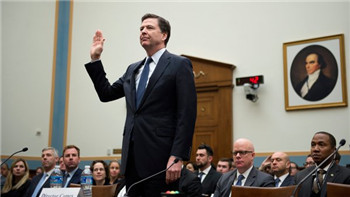
WASHINGTON — The head of the F.B.I. acknowledged on Tuesday that his agency lost a chance to capture data from the iPhone used by one of the San Bernardino attackers when it ordered that his password to the online storage service iCloud be reset shortly after the rampage.
华盛顿——联邦调查局(FBI)负责人本周二承认,在圣贝纳迪诺枪击案发生不久后,FBI下令重置了该案一名枪手在iCloud在线存储服务上的密码,结果贻误了从该枪手的iPhone中提取数据的机会。
“There was a mistake made in the 24 hours after the attack,” James B. Comey Jr., the director of the F.B.I., told lawmakers at a hearing on the government’s attempt to force Apple to help “unlock” the iPhone.
“在袭击事件发生24小时之内,犯了一个错误,”在政府企图迫使苹果公司帮助“解锁”这部iPhone的一场听证会上,FBI局长小詹姆斯·B·科米(James B. Comey Jr.)对议员说。
F.B.I. personnel apparently believed that by resetting the iCloud password, they could get access to information stored on the iPhone. Instead, the change had the opposite effect — locking them out and eliminating other means of getting in.
FBI探员似乎以为,通过重置iCloud密码,他们就可以访问到存储在iPhone上的信息。结果却截然相反——他们被锁在外面,再也找不到进入手机的其他方法了。
The iPhone used by Syed Rizwan Farook, one of the assailants in the Dec. 2 attack in which 14 people were killed, is at the center of a fierce legal and political fight over the balance between national security and consumer privacy. Many lawmakers at Tuesday’s hearing of the House Judiciary Committee seemed torn over where to draw the line.
这部iPhone的使用者是赛义德·里兹万·法鲁克(Syed Rizwan Farook),他是去年12月2日一场枪击案中的袭击者之一。那场枪击案导致了14人丧生。国家安全和消费者隐私权在法律和政治层面的一场激烈斗争,正在围绕着这部iPhone展开。在众议院司法委员会(Judiciary Committee)周二举行的听证会上,很多议员对于界限应该在哪里感到心情矛盾。
“The big question for our country is how much privacy are we going to give up in the name of security,” Representative Jason Chaffetz, a Utah Republican, told Mr. Comey. “And there’s no easy answer to that.”
“我国的一个重大问题是:我们要为安全的名义放弃多少隐私?”犹他州共和党众议员贾森·沙费特兹(Jason Chaffetz)对科米说。“这个问题没有简单的答案。”
While some lawmakers voiced support for Apple’s privacy concerns, others attacked the company’s position, saying it threatened to deprive the authorities of evidence in critical cases involving newer iPhones.
虽然一些议员对苹果在隐私问题上的担忧表达了支持,但另外一些议员则对该公司的立场进行了攻击,称在涉及新款iPhone的重大案件中,这样做可能会让官方丧失一些证据。
“We’re going to create evidence-free zones?” asked Representative Trey Gowdy, a South Carolina Republican who once served as a federal prosecutor. “Am I missing something?”
“我们是要创造不能取证的地带吗?”曾担任联邦检察官的南卡罗来纳州共和党众议员特雷·高迪(Trey Gowdy)问道。“我错过什么了吗?”
“How the hell you can’t access a phone, I just find baffling,” he said.
“怎么就不能进入一部手机呢,我简直就不明白了,”他说。
Bruce Sewell, Apple’s general counsel, told committee members that the F.B.I.’s demand for technical help to unlock Mr. Farook’s iPhone 5c “would set a dangerous precedent for government intrusion on the privacy and safety of its citizens.” Apple has said that in many cases investigators have other means to gain access to crucial information, and in some instances it has turned over data stored in iCloud.
苹果公司总法律顾问布鲁斯·希维尔(Bruce Sewell)对委员会的成员表示,FBI让苹果提供技术支持,解锁法鲁克的iPhone 5c的要求“会为政府侵犯公民隐私和安全树立一个危险的先例”。苹果表示,很多情况下调查人员有其他取得关键信息的方法,并且在一些情况下,苹果移交了存储在iCloud上的信息。
Mr. Sewell reacted angrily to the Justice Department’s suggestion that Apple’s branding and marketing strategy was driving its resistance to helping the F.B.I., an assertion that he said made his “blood boil.”
司法部称,是苹果的品牌和营销战略促使其拒绝帮助FBI。对此,希维尔很愤怒,称这个说法令他“怒火中烧”。
“We don’t put up billboards that market our security,” he said. “We do this because we think protecting security and privacy of hundreds of millions of iPhones is the right thing to do.”
“我们不是在打广告宣传我们的安全,”他说。“我们这么做是因为我们认为,保护数亿iPhone用户的安全和隐私是正确的事。”












